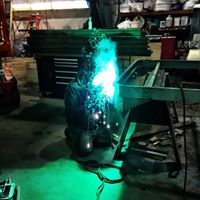James J Hines
age ~53
from Lanham, MD
- Also known as:
-
- James Hinesjr
James Hines Phones & Addresses
- Lanham, MD
- District Heights, MD
- Greenbelt, MD
- Landover, MD
- Severn, MD
- Laurel, MD
- Capitol Heights, MD
- 1717 Belle Haven Dr APT 103, Hyattsville, MD 20785 • (301)7734008
Work
-
Position:Executive, Administrative, and Managerial Occupations
Education
-
Degree:Associate degree or higher
Wikipedia References

James R. Hines Jr.
Isbn (Books And Publications)

Occupancy Estimation And Modeling: Inferring Patterns And Dynamics of Species Occurrence
view sourceAuthor
James E. Hines
ISBN #
0120887665


The Effects of Taxation on Multinational Corporations
view sourceAuthor
James R. Hines
ISBN #
0226240959





Comparative Fiscal Federalism: Comparing the European Court of Justice and the U.S. Supreme Court's Tax Jurisprudence
view sourceAuthor
James R. Hines
ISBN #
9041125523
Medicine Doctors

James R. Hines
view sourceSpecialties:
Obstetrics & Gynecology, Radiology
Work:
Valley OB/GYN ClinicValley Obstetrics & Gynecology Clinic
926 N Michigan Ave, Saginaw, MI 48602
(989)7538453 (phone), (989)7533519 (fax)
926 N Michigan Ave, Saginaw, MI 48602
(989)7538453 (phone), (989)7533519 (fax)
Education:
Medical School
Indiana University School of Medicine
Graduated: 1980
Indiana University School of Medicine
Graduated: 1980
Procedures:
Amniocentesis
Cystoscopy
Hysterectomy
Ovarian Surgery
Tubal Surgery
Urinary Flow Tests
Vaccine Administration
Vaginal Repair
Bladder Repair
Cesarean Section (C-Section)
Circumcision
Colposcopy
D & C Dilation and Curettage
Myomectomy
Oophorectomy
Skin Tags Removal
Vaginal Delivery
Vasectomy
Cystoscopy
Hysterectomy
Ovarian Surgery
Tubal Surgery
Urinary Flow Tests
Vaccine Administration
Vaginal Repair
Bladder Repair
Cesarean Section (C-Section)
Circumcision
Colposcopy
D & C Dilation and Curettage
Myomectomy
Oophorectomy
Skin Tags Removal
Vaginal Delivery
Vasectomy
Conditions:
Uterine Leiomyoma
Abdominal Hernia
Abnormal Vaginal Bleeding
Acne
Acute Bronchitis
Abdominal Hernia
Abnormal Vaginal Bleeding
Acne
Acute Bronchitis
Languages:
English
Spanish
Spanish
Description:
Dr. Hines graduated from the Indiana University School of Medicine in 1980. He works in Saginaw, MI and specializes in Obstetrics & Gynecology and Radiology. Dr. Hines is affiliated with Covenant Healthcare and St Marys Of Michigan Medical Center.

James J. Hines
view sourceSpecialties:
Cardiovascular Disease
Work:
Arizona Cardiology Group
340 E Palm Ln STE A175, Phoenix, AZ 85004
(602)3861100 (phone), (602)3861150 (fax)
Arizona Cardiology Group
1988 E Baseline Rd STE 101, Tempe, AZ 85283
(602)3861100 (phone), (602)3861150 (fax)
Arizona Cardiology Group
13555 W Mcdowell Rd STE 206, Goodyear, AZ 85395
(623)9357294 (phone), (623)9356510 (fax)
340 E Palm Ln STE A175, Phoenix, AZ 85004
(602)3861100 (phone), (602)3861150 (fax)
Arizona Cardiology Group
1988 E Baseline Rd STE 101, Tempe, AZ 85283
(602)3861100 (phone), (602)3861150 (fax)
Arizona Cardiology Group
13555 W Mcdowell Rd STE 206, Goodyear, AZ 85395
(623)9357294 (phone), (623)9356510 (fax)
Education:
Medical School
Northwestern University Feinberg School of Medicine
Graduated: 1978
Northwestern University Feinberg School of Medicine
Graduated: 1978
Procedures:
Angioplasty
Cardiac Catheterization
Cardiac Stress Test
Cardioversion
Continuous EKG
Echocardiogram
Electrocardiogram (EKG or ECG)
Pacemaker and Defibrillator Procedures
Cardiac Catheterization
Cardiac Stress Test
Cardioversion
Continuous EKG
Echocardiogram
Electrocardiogram (EKG or ECG)
Pacemaker and Defibrillator Procedures
Conditions:
Angina Pectoris
Aortic Valvular Disease
Conduction Disorders
Mitral Valvular Disease
Acute Myocardial Infarction (AMI)
Aortic Valvular Disease
Conduction Disorders
Mitral Valvular Disease
Acute Myocardial Infarction (AMI)
Languages:
English
Spanish
Spanish
Description:
Dr. Hines graduated from the Northwestern University Feinberg School of Medicine in 1978. He works in Phoenix, AZ and 2 other locations and specializes in Cardiovascular Disease. Dr. Hines is affiliated with Banner Estrella Medical Center, Banner University Medical Center Phoenix and Saint Joseph Hospital & Medical Center.

James C. Hines
view sourceSpecialties:
Internal Medicine
Work:
Thomas-Spann Clinic
7121 S Padre Is Dr STE 300, Corpus Christi, TX 78412
(361)6966200 (phone), (361)6966060 (fax)
7121 S Padre Is Dr STE 300, Corpus Christi, TX 78412
(361)6966200 (phone), (361)6966060 (fax)
Education:
Medical School
University of Texas Medical Branch at Galveston
Graduated: 1974
University of Texas Medical Branch at Galveston
Graduated: 1974
Procedures:
Cardiac Stress Test
Electrocardiogram (EKG or ECG)
Vaccine Administration
Electrocardiogram (EKG or ECG)
Vaccine Administration
Conditions:
Abdominal Hernia
Acute Pancreatitis
Acute Renal Failure
Acute Sinusitis
Anemia
Acute Pancreatitis
Acute Renal Failure
Acute Sinusitis
Anemia
Languages:
English
Description:
Dr. Hines graduated from the University of Texas Medical Branch at Galveston in 1974. He works in Corpus Christi, TX and specializes in Internal Medicine.

James E. Hines Iii
view sourceSpecialties:
Family Medicine
Work:
Fairfield Medical Clinic Inc
2153 N Foster Dr, Baton Rouge, LA 70806
(225)3569775 (phone), (225)3577768 (fax)
2153 N Foster Dr, Baton Rouge, LA 70806
(225)3569775 (phone), (225)3577768 (fax)
Education:
Medical School
Meharry Medical College School of Medicine
Graduated: 1978
Meharry Medical College School of Medicine
Graduated: 1978
Procedures:
Allergen Immunotherapy
Allergy Testing
Allergy Testing
Conditions:
Acute Bronchitis
Acute Pharyngitis
Acute Upper Respiratory Tract Infections
Angina Pectoris
Anxiety Phobic Disorders
Acute Pharyngitis
Acute Upper Respiratory Tract Infections
Angina Pectoris
Anxiety Phobic Disorders
Languages:
English
Spanish
Spanish
Description:
Dr. Hines III graduated from the Meharry Medical College School of Medicine in 1978. He works in Baton Rouge, LA and specializes in Family Medicine.

James C Hines
view sourceSpecialties:
Internal Medicine
Name / Title
Company / Classification
Phones & Addresses
WEB MARKETING PARTNERS, LTD., LLC
E & H COMMUNICATIONS SERVICES LLC
HINES COMMUNICATIONS SERVICES LLC
INNER CITY PROPERTIES, LLC
VECTOR CAPITAL GROUP, INC
AGGRESSIVE FAITH MINISTRIES
Director, Vice President
Tampa Bay Properties Inc
Resumes

James Hines Baltimore, MD
view sourceWork:
Coastal sunbelt Produce
Jul 2013 to 2000
Order Puller Bakers Express/Command Labor
Baltimore, MD
Oct 2010 to Feb 2012
Warehouse Worker/Temp Opta Minerals/Command Labor
Baltimore, MD
Jun 2010 to Oct 2010
Warehouse Worker/Temp
Jul 2013 to 2000
Order Puller Bakers Express/Command Labor
Baltimore, MD
Oct 2010 to Feb 2012
Warehouse Worker/Temp Opta Minerals/Command Labor
Baltimore, MD
Jun 2010 to Oct 2010
Warehouse Worker/Temp
Education:
Woodland Job Corp
Laurel, MD
2000 to 2001
Building and Apartment Maintinance/Apprentice/GED in Building and Apartment Maintinance/GED
Laurel, MD
2000 to 2001
Building and Apartment Maintinance/Apprentice/GED in Building and Apartment Maintinance/GED
Skills:
Ability to work in a professional manner,problem solve,and work as a team player.Ability to operate pallet jack and forklift.
Classmates

James Hines
view sourceSchools:
Little Falls Jr. High School Little Falls MN 1974-1978

James A. Hines, III (Hines)
view sourceSchools:
Lafayette High School Lafayette AL 1961-1965

James Hines
view sourceSchools:
Mankato High School - Closed 1973 Mankato MN 1945-1949
Community:
Jeanie Cooke, Clare Ava, Nancy Tscharner

James Hines
view sourceSchools:
Edgar L. Miller Elementary School Merrillville IN 1973-1977, Warren G. Harding Elementary School Hammond IN 1977-1980, Morton Middle School Hammond IN 1977-1980, Charles N. Scott Middle School Hammond IN 1980-1982
Community:
David Eberle, Ron Shindle

James Hines
view sourceSchools:
Noxubee County High School Macon MS 1965-1969

James Hines
view sourceSchools:
Scottdale High School Scottdale PA 1938-1942
Community:
Ruby Vernon, Marty Thoburn, Susan Peterman, Eugene Dillinger, Donna Pauley

James Hines
view sourceSchools:
Nash Junior High School Clifton IL 1971-1975
Community:
Curt Stevenson, Jennifer Gross, Shane Merritt, Lynnae Murray, James Demers

James Hines
view sourceSchools:
Masontown High School Masontown PA 1954-1958
Community:
Vern Fordyce, Thomas Lee

James Heckington Hines
view source
James Gregory Hines
view source
Knor William James Hines
view source
James M Hines
view source
James E Hines
view source
James M Hines
view source
James M. Hines
view source
James Bernard Hines
view sourceYoutube
Myspace
Googleplus

James Hines
Work:
Hines Property
Education:
RMIT University, Pembroke School, University of South Australia

James Hines
Work:
Da Jams Records - Owner

James Hines
About:
I am a person who loves who hunt, fish, and do anything in the outdoors
Tagline:
I love to hunt, fish, hike, and do anything that has to do with the outdoors

James Hines (Badboy1298)

James Hines

James Hines

James Hines

James Hines
Flickr
News

Gartner foresees 250M connected vehicles on the road by 2020
view source- While several major carmakers have rolled out connected vehicles in a limited number of models, in-vehicle wireless connectivity is rapidly expanding from luxury models and premium brands to high-volume midmarket models, Gartner analyst James Hines said.
- Date: Jan 26, 2015
- Category: Sci/Tech
- Source: Google

Solar: Chinese efficiency vs. US innovation
view source- U.S. solar companies were also hurt by banks and other institutions that finance solar projects becoming "extremely risk-averse" since the 2008 financial crisis, making them much more prone to support projects using traditional solar panels, said Gartner analyst James Hines.
- Date: Oct 24, 2011
- Category: Business
- Source: Google

Despite setbacks for U.S. solar industry, experts remain hopeful
view source- by banks and other institutions that finance solar projects becoming "extremely risk averse" since the 2008 financial crisis, making them much more prone to support projects using traditional solar panels, not cutting-edge alternatives from Silicon Valley companies, said Gartner analyst James Hines
- Date: Oct 02, 2011
- Category: Business
- Source: Google
Plaxo

James Hines
view sourceNew York, NYAccount Manager at WeRecoverData com

James F. Hines, Jr.
view sourceWashington, DC

James Hines
view source
James Hines
view sourceDirector Shopper Marketing at Hanesbrands Past: Vice President Customer Marketing & Analysis at Hanesbrands, VP Marketing Walmart Team at...

James Hines
view sourceBristol Myers Squibb

James Hines, Sr.
view sourceHines Norman Hines, P.L.

James Hines
view sourceSlidell, LA
Get Report for James J Hines from Lanham, MD, age ~53













